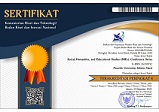Concept and Implementation Of Problem-Based Learning Model In Independent Curriculum
Abstract
This research aims to describe the Problem-Based Learning (PBL) Learning Model concept and its implementation in the Independent Curriculum in elementary schools. The research method used is the literature review research method, namely comparing data from several journals, which have been analyzed and summarized based on the author's experience, existing theories, and models. This research shows that Problem-Based Learning is a learning approach that emphasizes solving meaningful problems for students. PBL engages students in authentic problem-solving, enabling the collaborative development of high-level knowledge and skills. The goal is to create contextual and relevant learning experiences to prepare students with problem-solving skills that can be applied in real life. Implementing PBL involves five main steps: 1) student orientation to the problem. 2) Organizing students. 3) Guiding individual and group investigations. 4) Develop and present the results of the work. 5) Analysis and evaluation of the problem-solving process. Although PBL has advantages, such as increasing student motivation and building critical skills, it also has disadvantages related to dependence on the teacher's role and challenges in managing classrooms with diverse students. Thus, PBL prepares students with knowledge and forms students into individuals who are ready to face the challenges of daily life and the future. It is very relevant to the independent curriculum.
Keywords
Full Text:
PDFRefbacks
- There are currently no refbacks.





